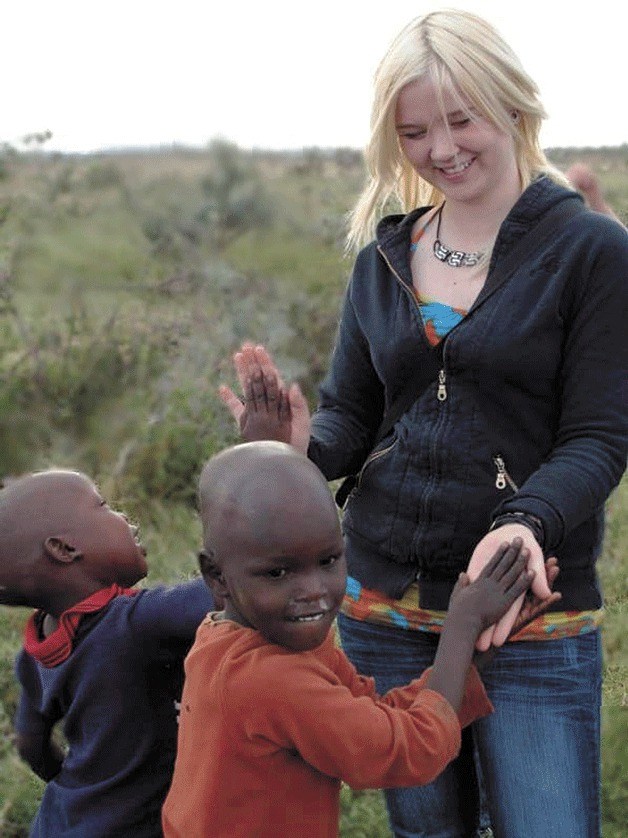How I spent my summer vacation: 10 feet from a pride of African lions ripping apart the carcass of a freshly killed wildebeest.
“They didn’t even pay us any attention,” said a still-shocked Kate Nilsen.
Nilsen, 18, and another Langley teen could write some riveting back-to-school reports after spending two weeks this past month in Kenya helping African youngsters get acquainted with computers.
“It was so amazing, so life-changing,” said Leah Cook, 17, back on South Whidbey from her first-ever trip outside the United States. “It’s hard to describe to anyone the impact it left on me.”
“It’s one of the most beautiful countries I’ve ever been to,” said the well-traveled Nilsen. “I’ve always wanted to go to Africa. The culture is incredibly different.”
Nilsen and Cook went to Kenya to help introduce basic computing to children in the Maasai village of Talok, a nine-hour drive over a dirt road from the capital city of Nairobi.
They and seven other college and high-school age students from Washington, Oregon and California took part in an education program sponsored by the Maasai Children’s Initiative, a nonprofit community-based organization.
The group’s mission is to help Maasai children, particularly girls, by providing education and technology training, and in the development of income-producing products, eco-tourism and intercultural exchanges.
Much of MCI’s funding comes from Matthew Bergman, a Vashon Island attorney, who is chairman of its board of directors.
Bergman is a friend of Nilsen’s family, and has had a vacation home on Whidbey Island. He persuaded Nilsen to make the trip. Cook’s mother Wendy heard of the adventure from Nilsen’s mother Trish, and Cook decided to go along.
Kate Nilsen said the Kenyan government has marginalized the proud Maasai to the point of exhibiting them as tourist attractions.
“They treat them like they weren’t part of the country,” she said.
She and Cook and the others worked with children ages 4 through 13, mostly girls. They taught them rudimentary computer skills in a solar-powered building built by MCI. Basic computer games were a big hit.
“They wanted to learn so much,” Cook said. “Even the teachers. It was the first time they ever used computers.”
“The Maasai rarely get hold of newspapers,” Nilsen added. “Giving them computer access keeps them up-to-date with all that is going on in their government and across the world.”
The teachers were particularly fascinated by Facebook and other social networking tools, Nilsen said.
She said the volunteers instructed about 30 youngsters one-on-one during the trip, and every day traveled to a different school in the surrounding villages.
“The people were very friendly with a great sense of humor,” Nilsen said. “They tell you the truth, even if it’s offensive.”
The volunteers stayed in nearby teachers’ dormitories and ate meals prepared with local ingredients.
“We really ate well,” Cook said. “All the meat was really fresh. It was mostly lamb or goat.”
It was winter in Kenya, so the weather was comfortably warm and breezy, with only one thunderstorm, Nilsen said. There were no mosquitoes and not many other bugs, “just really large, strange-looking moths,” she said.
But there was plenty of wildlife.
“All around us were animals,” Nilsen said. “On our drives out to the other schools, we would constantly pass giraffes, elephants, baboons, gazelles, wildebeest and zebras.”
Speaking of wildebeest, a highlight of the trip was going on that safari.
As they approached the lions dining on the carcass, the driver kept moving their vehicle closer.
“My heart was going crazy and I couldn’t believe my eyes,” Nilsen said. “We were completely shocked that we were so close to some of the most dangerous carnivores on Earth.”
Nilsen attended South Whidbey High School and graduated this past year from Coupeville High after a year of study in Thailand as a Rotary Scholar. She also has traveled to Peru, Israel and Norway, and plans to visit Nepal.
Cook will be a senior at South Whidbey High School in the fall, and plans to attend college to study physical therapy, she said.
Both hope to return to Kenya, but perhaps for longer next time, to make the 40-hour plane travel worthwhile.
“There’s so much more that can be done over there,” Cook said. “I definitely want to go back to Africa — and to other third-world countries, to see how they live.”
The Kenya trip also provided a lesson in minimalism, the teens said.
When the volunteers arrived in Nairobi, their luggage was nowhere to be found.
Nilsen, a seasoned traveler, had extra clothing in her backpack, but the remaining members of the group, including Cook, had to borrow from each other, buy locally or wear the same outfits for the duration.
On the way back home, they discovered their missing luggage had been at the Nairobi airport the entire time.
“I had clean clothes for the airplane going back,” Cook said. “It was a great feeling.”
“But it also showed how little you can live on,” she added.



